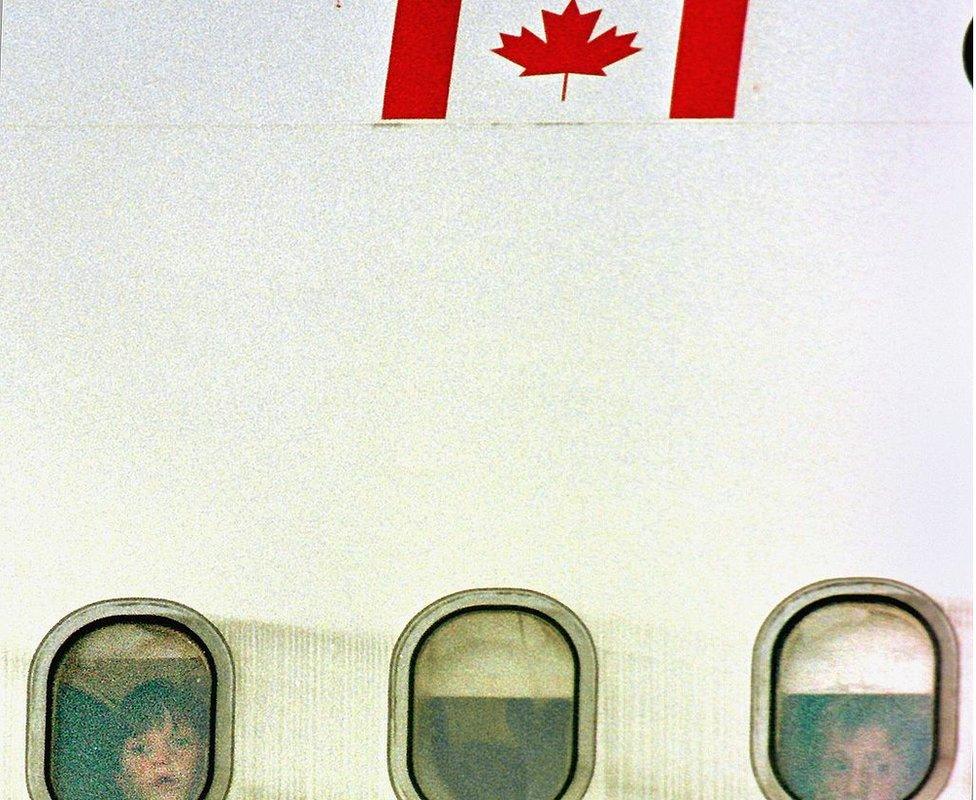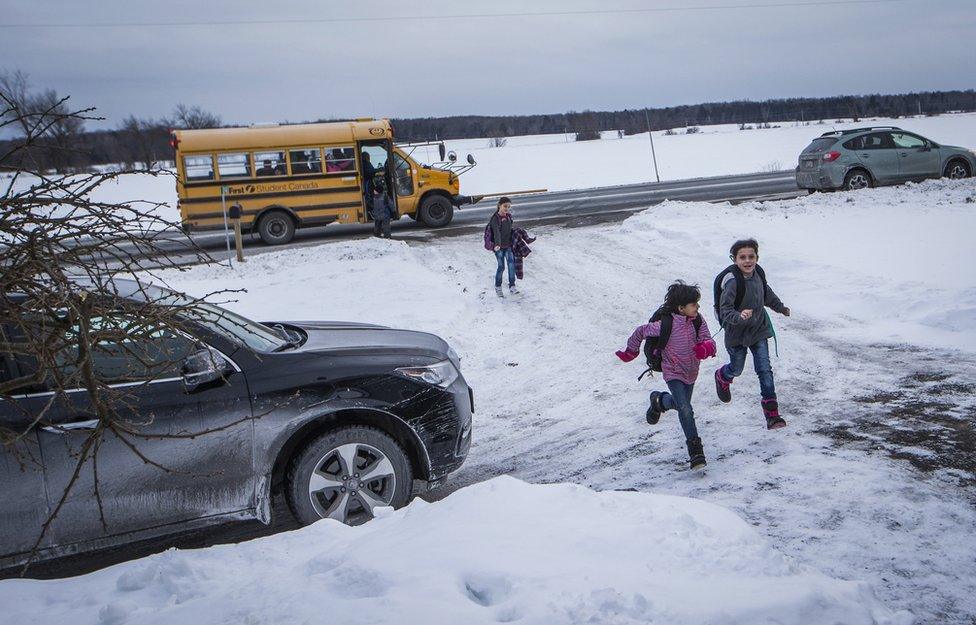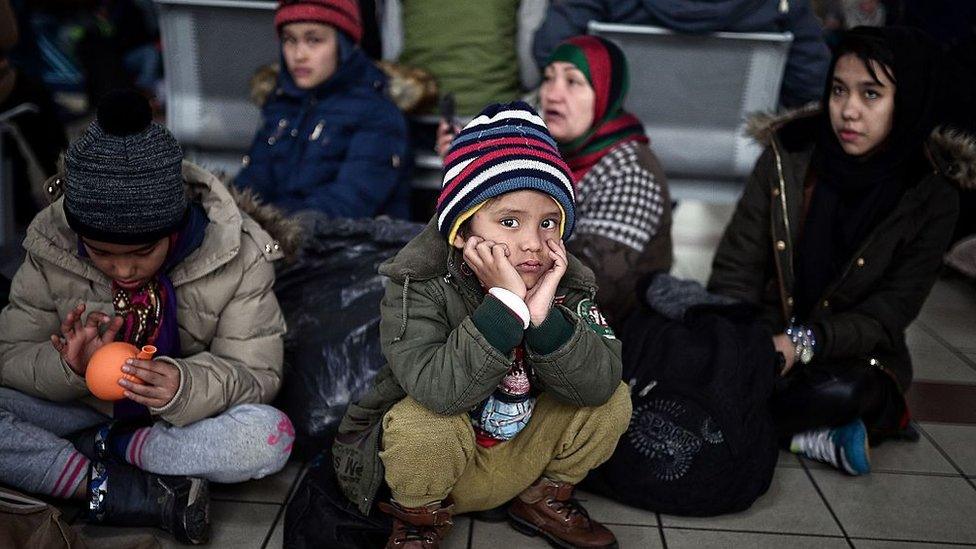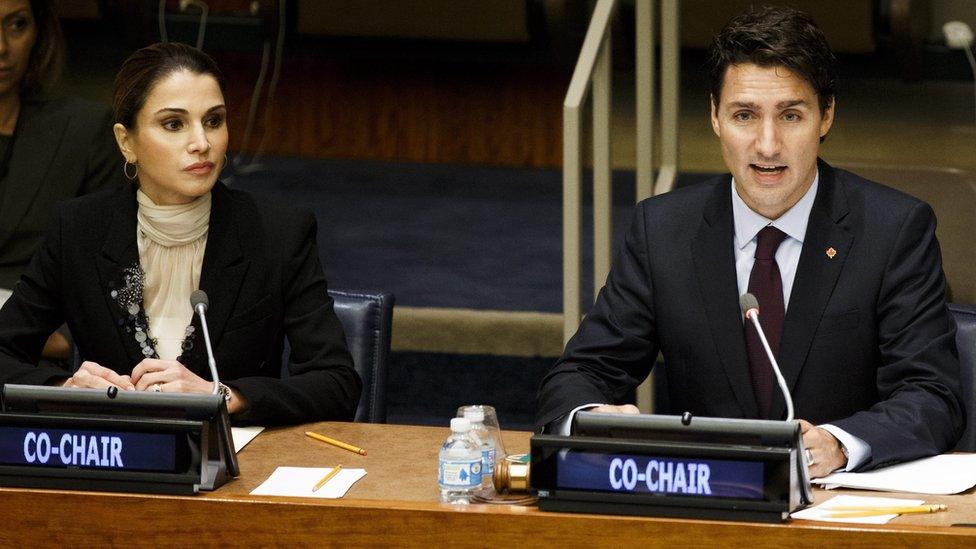The unique programme that brings refugees to Canada
- Published
'New Canadians' settle in as acceptance rate slows
Just over a year ago, the image of Alan Kurdi lying washed up on a Turkish shore shocked the world and brought the human tragedy of the global refugee crisis into sharp relief.
The photograph of the three-year-old's body also served as a tipping point in Canada's 2015 federal election campaign when the country learned the toddler's aunt had tried unsuccessfully to bring his relatives into the country.
In the ensuing months, people across the country voluntarily organised to sponsor Syrian refugees.
Canada's private sponsorship programme is the oldest and best known in the world. Its implementation coincided with another conflict four decades ago.
The new policy came into force in 1978 under former Prime Minister Pierre Trudeau's government, just as people were growing increasingly alarmed at the plight of hundreds of thousands of Vietnamese, Cambodians and Laotians fleeing communist regimes by sea in leaking, unsafe boats.
The programme, overseen by the federal government, allows groups of private citizens - often with ties to faith-based organisations, cultural groups or humanitarian organisations - to directly sponsor refugees.

Two refugee children from Kosovo arrive in Canada in 1999
This means providing the newcomers with basic material needs like food, clothing, and housing, as well as help adjusting to Canadian society.
From January 1979 to December 1980, Canada resettled 60,049 so-called "boat people." More than 50%, were privately sponsored, often by complete strangers.
"It really touched a nerve," said Brian Dyck, national migration and resettlement co-ordinator with the Mennonite Central Committee, among the first groups to work with the federal government to assist in private sponsorship in Canada.
"They felt compelled to get involved."
That generosity won "the people of Canada" the 1986 UN's Nansen refugee award, which recognises outstanding service to the causes of refugees - the only time the medal has been awarded to a whole country.

More from the BBC

Running home from school
Syrian refugees settle into new lives in Canada
In a small, crowded classroom in tiny Belleville, Ontario, Syria native Abdel Malek al-Jasem is learning some very important terms in English.
Coat, gloves, toque, scarf and boots. He scribbles them in a notebook next to their Arabic translations.
He will need all of that gear as he adjusts to life in Canada.

Since 1979, Canada has resettled over 275,000 refugees under the private sponsorship programme, though the number of private sponsorships dipped in recent years to around 3,000 to 5,000 annually from that initial peak.
But following the publication of Alan Kurdi's image on front pages nationwide, settlement groups that assisted private sponsorships were quickly overwhelmed by the demand.
"You kept getting calls on a daily basis," said Lora Remacka, program coordinator with Toronto's Lifeline Syria.
Since last November, Canada has welcomed over 30,000 Syrian refugees. Almost 11,300 were brought in through private sponsorship.
By the end of this year, the federal government expects to have resettled some 44,000 refugees in total, not just from Syria, including almost 18,000 privately sponsored refugees.
Between 2013 to mid-2015, Canada settled roughly 2,500 Syrian refugees, of which about 1,600 were privately sponsored.

In 2012, Australia launched a pilot sponsorship project based on the programme. In 2015, the United Kingdom announced it was considering creating a similar model.
Dyck told the BBC in a phone interview from New York, where he was attending refugee and migration summit at the United Nations General Assembly, that the programme "changes people individually, it shapes societies".
"It makes it very personal for them, and that has shaped Canadians' attitudes to international incidents in general," he said.
Still, the programme is not without hurdles.
Remacka, whose organisation has processed over 800 refugees since last year, 150 of which have arrived in Canada, said there has been a wane in interest. Lifeline Syria currently has about 550 current cases they have been unable to match with sponsors.
"In the beginning we had too many (sponsors)," she said. "Now we don't have enough."
A report on the use of Toronto food banks released this week noted a surge in the first three months of 2016, linked in part to an influx of newcomers, including Syrian refugees.

Prime Minister Justin Trudeau and Queen Rania al-Abdullah of Jordan host a meeting on refugees
Over 60% of the Syrian refugees interviewed by the food banks were privately sponsored.
On Monday, Prime Minister Justin Trudeau, who is in New York for the United Nations general assembly, announced Canada will boost its humanitarian spending by 10% over the 2016-17 fiscal year. He also announced $467m (£272) in longer term funding to address the crises in Syria, Iraq, and the surrounding region.
On the same day, the Canadian government, in partnership with the UN refugee agency and the Open Society Foundation, announced a new programme aimed at promoting the use of the private sponsorship option worldwide.
This effort includes the creation of a training programme on how to implement and adapt the Canadian sponsorship model.